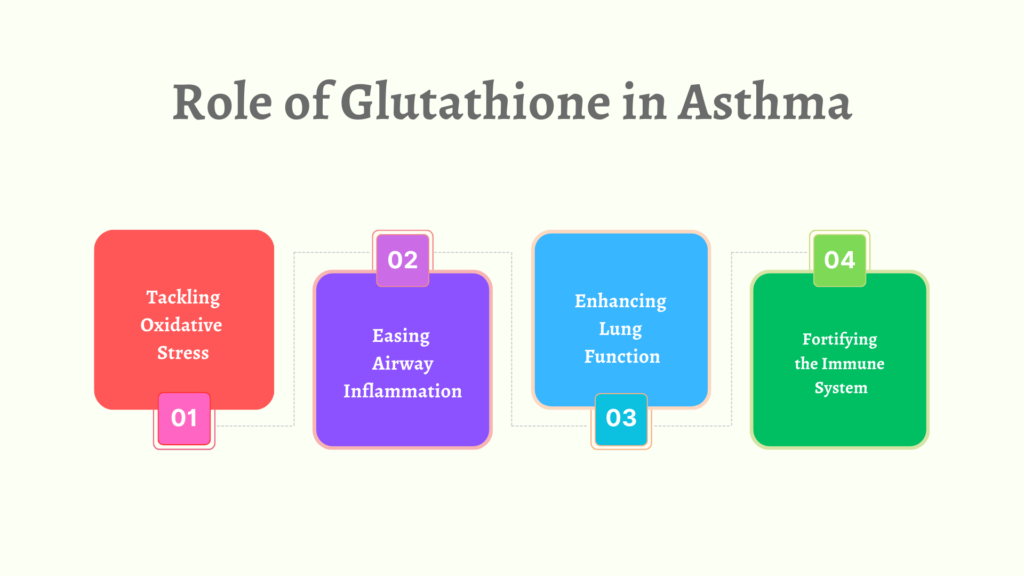Asthma, a chronic respiratory condition affecting millions globally, is characterized by airway inflammation leading to symptoms such as wheezing, shortness of breath, chest tightness, and coughing. There is significant potential of glutathione in asthma management. Effective asthma management typically involves a multifaceted approach encompassing medications, lifestyle adaptations, and the avoidance of triggers. In recent years, the potential of glutathione in alleviating asthma symptoms and enhancing overall lung health has gained increasing attention. In this comprehensive guide, we will explore what glutathione is, its role in asthma management, and the potential benefits of incorporating it into your asthma treatment strategy.
Understanding Glutathione

Glutathione, often referred to as GSH, is a tripeptide molecule composed of three essential amino acids: cysteine, glutamic acid, and glycine. This remarkable compound plays a pivotal role in maintaining the balance between oxidative and antioxidative processes within the human body. Glutathione functions as a powerful antioxidant, shielding our cells from damage caused by free radicals and reactive oxygen species. Moreover, it facilitates detoxification by binding to toxins and assisting in their elimination from the body.
In the context of asthma, glutathione assumes significance for its potential to combat oxidative stress and inflammation within the airways. Asthma is closely linked to oxidative stress, a state where there is an imbalance between the production of free radicals and the body’s ability to neutralize them. This oxidative stress fuels inflammation and damages airway cells, thus worsening asthma symptoms.
The Role of Glutathione in Asthma

- Tackling Oxidative Stress
One of the pivotal roles of glutathione in asthma management is its capacity to counteract oxidative stress. Individuals with asthma often exhibit reduced levels of glutathione in their lung tissues and bronchoalveolar fluid, which is correlated with increased oxidative stress. This decrease in glutathione levels may be attributed to genetic factors, environmental influences, or the usage of specific medications. Unchecked oxidative stress amplifies asthma symptoms and contributes to long-term damage in the lungs.
Glutathione functions as a formidable antioxidant by quelling free radicals and reactive oxygen species, the culprits behind oxidative stress. Elevating glutathione levels in the body can mitigate the detrimental effects of oxidative stress on the airways, potentially leading to improved asthma control.
- Easing Airway Inflammation
Asthma is characterized by chronic airway inflammation, a process that triggers bronchoconstriction and gradual airway remodeling. Inflammation in the airways is driven by several factors, including the activation of immune cells and the release of pro-inflammatory molecules. Glutathione has demonstrated its prowess in moderating inflammation by diminishing the production of these pro-inflammatory molecules.
Research indicates that glutathione can inhibit the activation of nuclear factor kappa B (NF-κB), a transcription factor that plays a pivotal role in the expression of genes responsible for inflammation. By restraining NF-κB, glutathione helps in downregulating the inflammatory response within the airways, potentially ameliorating asthma symptoms.
- Enhancing Lung Function
Enhancing lung function is a primary objective in asthma management. Diminished lung function, assessed through the forced expiratory volume in one second (FEV1), often serves as a marker of asthma severity. Glutathione demonstrates promise in boosting lung function among individuals with asthma.
One potential mechanism by which glutathione improves lung function involves relaxing the smooth muscles in the airways, thus averting their constriction during asthma attacks. Additionally, glutathione’s ability to reduce airway inflammation can further enhance lung function by preventing the narrowing of airways. By augmenting lung function, glutathione may enable individuals with asthma to breathe more comfortably and reduce the frequency and severity of asthma symptoms.
- Fortifying the Immune System
A robust immune system is imperative for individuals with asthma as infections and respiratory illnesses can exacerbate their symptoms. Glutathione plays a role in supporting the immune system by enhancing the function of immune cells like T cells and natural killer cells. This augmentation can empower individuals with asthma to better ward off respiratory infections that could trigger asthma attacks.
Supplementing with Glutathione
There are various methods to elevate glutathione levels in the body, encompassing dietary choices, lifestyle modifications, and supplementation. Here are some strategies for augmenting glutathione:
- Dietary Choices: Incorporating glutathione-boosting foods into your diet can aid in raising glutathione levels. Foods rich in cysteine, such as eggs, garlic, and onions, support glutathione production. Additionally, selenium-rich foods like Brazil nuts enhance the efficiency of the enzyme responsible for recycling glutathione in the body.
- N-acetylcysteine (NAC): NAC is a supplement that provides cysteine, a precursor to glutathione. It is often employed to increase glutathione levels in individuals with asthma. NAC has also demonstrated the potential to reduce exacerbations and enhance lung function in certain asthmatic patients.
- Glutathione Supplements: Some individuals may benefit from direct glutathione supplementation. These supplements are available in various forms, including oral capsules, sublingual sprays, and intravenous injections. The choice of supplementation method should be made in consultation with a healthcare professional, as each form has varying bioavailability and potential side effects.
- Exercise: Regular physical activity can elevate glutathione levels. Exercise promotes the release of glutathione and supports its role in mitigating oxidative stress. However, individuals with asthma should exercise with caution and develop a personalized plan in consultation with their healthcare provider.
- Lifestyle Modifications: Reducing exposure to environmental toxins and pollutants can help maintain glutathione levels in the body. This includes avoiding smoking and secondhand smoke, and minimizing exposure to air pollution and allergens.
Glutathione plays a vital role in mitigating oxidative stress, reducing airway inflammation, enhancing lung function, and supporting the immune system in individuals with asthma. It represents a promising avenue for improving asthma management and symptom control. However, it is essential to consult with a healthcare professional before initiating any new treatments or supplements, including those aimed at increasing glutathione levels. They can provide personalized guidance and help determine the most appropriate approach to incorporating glutathione into an individual’s asthma management plan. As research in this area continues to evolve, glutathione may become an increasingly valuable component of comprehensive asthma care, offering hope for better quality of life for those affected by this chronic respiratory condition.
Written by-
Sayem Al HelalGraduate Health Technologist (University of Dhaka)
Former Paramedic (Urban Primary Health Care Project)
References:
- Medical Journals: Look for research articles in medical journals that discuss the role of glutathione in asthma management. Some reputable medical journals that often feature articles on asthma and related topics include the “Journal of Allergy and Clinical Immunology” and the “American Journal of Respiratory and Critical Care Medicine.”
- Academic Books: Consider citing books written by experts in the field of respiratory medicine and immunology, particularly those that delve into the biochemistry and pharmacology of antioxidants like glutathione.
- Health Organizations: Reference guidelines and publications from reputable health organizations like the World Health Organization (WHO), the American Lung Association, and the National Heart, Lung, and Blood Institute (NHLBI).
- Government Health Agencies: You can also include information from government health agencies like the Centers for Disease Control and Prevention (CDC) and the National Institutes of Health (NIH).
- Scientific Reviews: Peer-reviewed literature reviews or meta-analyses that summarize and analyze multiple studies on glutathione and asthma can provide a well-rounded view of the current state of research.
- Clinical Trials: If there are ongoing or recent clinical trials related to glutathione and asthma, referencing the trial protocols or results can provide valuable insights.
Image credit: Image by vector4stock on Freepik


Please tell me more about your excellent articles
Thank you for writing this post!
I’m so in love with this. You did a great job!!